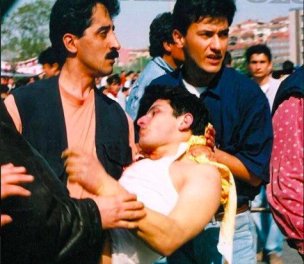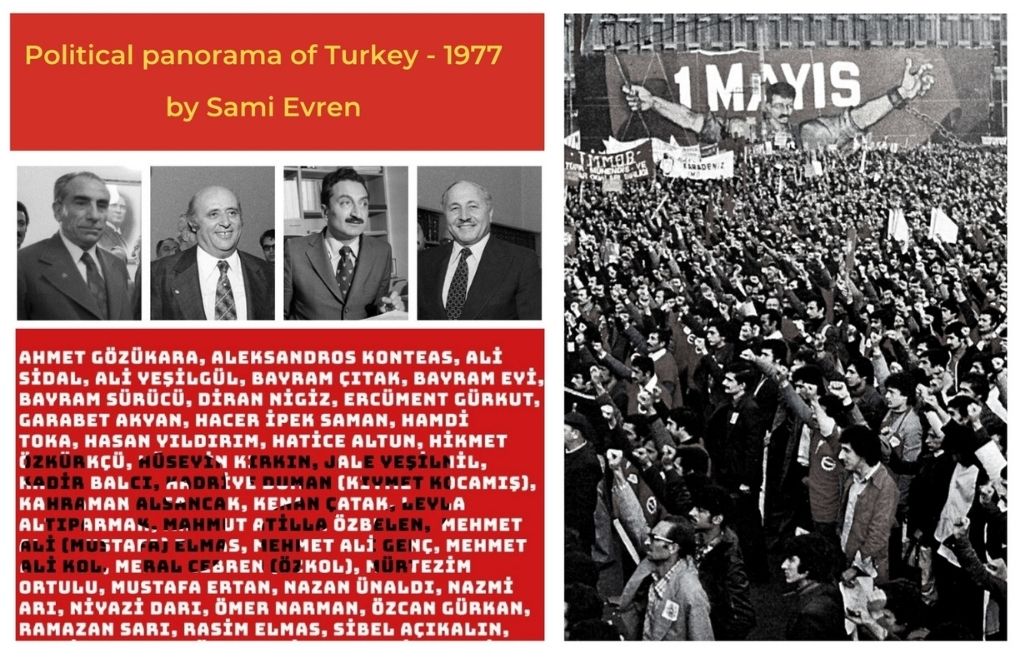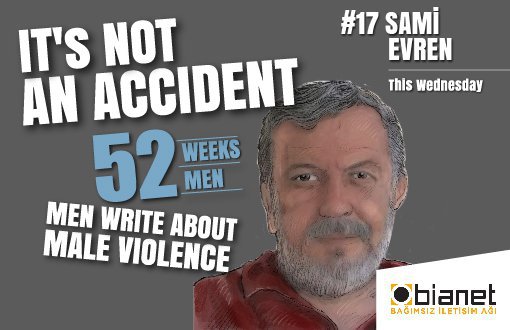Click to read the article in Turkish
When I sat at the computer to write about May 1, 1989, several different pictures started to hover around me, trying to come to the fore.
Remembering these pictures after 32 years and going through this moment again today... I will try to write the successive state of things, complementing one another all downhill from here, as the old saying goes.
CLICK - '1 May 1977 The Voices of Those Who Lost Their Loved Ones / 1 May 1977 and Impunity'
I came to İstanbul in 1983, in the years when the crises of the military coup in Turkey on September 12, 1980 had not yet abated. Remembering June 15-16, 1970, the most important turning point in the history of the working class, by looking at the ships in the dock while walking from Unkapanı along the Golden Horn fills one with a different emotion.
I never forget Ömer Hayyam bus stop, which I went past to reach Taksim through Tarlabaşı Boulevard. Because this bus stop was our meeting point in the Labor Day of 1989.
1989
In Turkey, 1989 started with President Kenan Evren and ended with President Turgut Özal. When the world entered the new year, the "Cold War" was still ongoing. While we were about to bid farewell to the year, Union of Soviet Socialist Republics (USSR) leader Mikhail Gorbachev and the new US President George W. Bush had ended the Cold War.
The Berlin Wall - of course - fell, too.
With the fall of the Berlin Wall, the process leading up to the collapse of the USSR began. Seeing that people took to the streets in Yugoslavia and Romania, expressing their demands for a regime change, the peoples of the Soviet Bloc republics would follow suit.
At Tiananmen Square in China, one million people were crying out loud their demand for freedom.
In that year, when people started to say, "Socialism is dead", the right was faltering in Turkey, which was preparing to say farewell to Kenan Evren, the leader of the military coup on September 12, 1980.
ANAP/ Özal
Contrary to expectations, the Nationalist Democracy Party (MDP), which the coup leaders made a retired general establish for the first election, could not win the election. The Motherland Party (ANAP) did.
Having bureaucrats and bankers among its cadres, the ANAP defined itself as the representative of four tendencies and as a liberal political party. These developments were a harbinger of a new mobility in politics and social opposition in Turkey in the post-coup period.
Despite the objections of Özal, the political bans imposed on political party executives and several citizens by the 1982 Constitution were lifted in the referendum on September 6, 1987, albeit by a narrow margin.
Thus, the "liberalism" of Özal was revealed. Turgut Özal, the architect of the January 24, 1980 resolutions, which were defined as a bitter pill for laborers, found the opportunity to put this economic program into practice under the shadow of guns. Promising stability in liberalization and economy, Özal's attitude about political bans made himself controversial.
Local elections
The local elections on March 26, 1989 were an answer to this, in a sense: Özal's ANAP could receive only 21.8 percent of the votes. In fact, it was the leading party in the local elections in 1984 with 41.5 percent.
This time, the leading party was the recently founded Social Democratic Populist Party (SHP), which received 28.7 percent of the votes. The SHP won 652 municipalities and eight metropolitan municipalities (namely, Adana, Ankara, Antep, İstanbul, İzmir, Kayseri) across the country.
Chaired by Süleyman Demirel, the True Path Party (DYP) increased its votes from 13.2 percent to 25.1 percent.
The top state officials
On May 1, 1989, the ANAP was the ruling party. Turgut Özal was the Prime Minister. Mustafa Kalemli was the Interior Minister. After Özal became the President on November 9, 1989, Yıldırım Akbulut became the Prime Minister, Abdülkadir Aksu the Interior Minister and Oltan Sungurlu kept his seat as the Justice Minister for the two successive terms.
The Governor of İstanbul was Cahit Bayar and the İstanbul Security Director was Hamdi Ardalı. The population of Turkey was 54 million 19 thousand, while 6 million 893 thousand 700 of them were in İstanbul.
War
Beginning with the raids of the Kurdistan Workers Party (PKK) on Eruh and Şemdinli gendarmerie stations on August 15, 1984 and considered to be done by a "bunch of freebooters", this situation started to make its presence felt in different parts of the country.
By the decrees of Censorship - Exile (SS in Tr.), newspapers would start to come out with white marks, Kurds in the East and Southeast Turkey would be sent to live in another place, they would be exiled.
With the State of Emergency administration, Turkey turned into a country with "two constitutions": One for the East, another for the West.
Hunger strikes, death fasts
A series of legal arrangements, known as the Circular of August 1, were introduced, forcing prisoners to wear uniforms and stepping up pressures. Prisoners' response to this was hunger strike and death fast.
While prisoners' resistance was ongoing behind bars, rights defenders were protesting outside, calling on the authorities to "withdraw the circular." The state's response to it was attack, detention and arrest.
For instance, a group of women who would be known as "Women in Black" lied on the ground in İstanbul's Cağaloğlu and stopped the traffic. 11 of these women in black found themselves in Sağmalcılar Prison.
When critical news started to come from hunger striking and death fasting prisoners, Aziz Nesin, Emil Galip Sandalcı, Mina Urgan, Rasih Nuri İleri and Mehmet Ali Aybar went on a two-day hunger strike in Pera Palas, drawing the attention of the state, country and world to prisons.
Headscarf/ hijab
In 1989, President Kenan Evren took the Council of Higher Education (YÖK) Law's provision on "headscarf" to the Constitutional Court.
Concluding that the provision was against the Constitution, the Constitutional Court rescinded the additional provision indicating that "covering neck and hair with a cloth or hijab due to religious faith in higher education institutions, courses, laboratories... is free."
This ruling, handed down by the top court shortly before the local elections on March 26, 1989, was protested in rallies across the country.
Universities
As of 1987, there were increasing demands at universities following the "Spring protests", students started to get organized.
Students were raising their voices, saying, "Free education against fees at universities", "No to uniform student associations", "Abolish the YÖK" and "No to disciplinary arrangements/ practices". They were expressing their demands for more democracy.
Unions
Not shuttered by the putschists of September 12 and going down in history as a confederation acting in accord with the putschists of the time, the Confederation of Turkish Trade Unions (TÜRK-İŞ) was trying to absorb the grassroots bursts of rage with meetings in conference halls.
The late 1980s were the years when some progressive unions affiliated with the TÜRK-İŞ were raising their demands for democracy. Before March-April 1989, the Collective Bargaining in the Public Sector ended in a deadlock and the government took on an irreconcilable attitude in this process, which led to the onset of the "Spring Protests."
Ahead of May 1
The protests took different forms, such as "walking the wards in groups, holding marches barefoot, growing beard collectively, shaving heads, refusing to get on service vehicles, holdig demonstrations with empty pots, sending telegrams to politicians in groups."
May Day, which had never been in the tradition or on the agenda of the working class mobility, had always been waved aside.
Amid the wave of Spring protests, various labor unions in İstanbul decided to celebrate May Day in 1989. An organization committee was set up by the representatives of some unions such as the Petrol-İş, TÜMTİS, Deri-İş, Otomobil-İş, Laspetkim-İş, Kristal-İş and Hava-İş.
The plan was to march from Mecidiyeköy to the Abideye Hürriyet square. However, the chairs of the related unions decided to not celebrate the May Day. We understand that, unable to withstand the pressures of political power holders, they changed their minds.
In Taksim
Revolutionary groups, except for unions, decided to celebrate May Day in Taksim.
* The Confederation of Progressive Trade Union of Turkey (DİSK) was closed after the military coup on September 12; some of its executives were arrested. The DİSK was opened again on January 19, 1992.
Meeting in İstanbul Eğit-Der Branch
The late lawyer Bülent Yüksek was the İstanbul Branch Chair of the Educationists Union (Eğit-Der). With the then executives A. Latif Epözdemir, Lütfü Eren, Ömer Aydın and İsmail Sarıoğlu, we started to hold our meetings, with the May Day as the main issue on the agenda.
Eğit-Der, with retired teachers as the full members of the association and working teachers as its honorary members, took on an important task for the unionization of public employees.
Our main slogan was the following: "From Eğit-Der to EĞİT-SEN, union rights with strike and collective contract." The stifling effect of September 12 was still in the air. Thousands of revolutionaries were arrested.
Decision
There were very few democratic mass organizations. The Eğit-Der branch in İstanbul's Aksaray was also an important place where revolutionary groups had meetings, dropped by and spent time. Following meetings on May Day in this atmosphere, we decided to celebrate it in Taksim.
Our chance of taking to Taksim and putting our decision into effect was very slim. Because it was not possible to access the site unless a very strong mass movement developed in this site which had been blockaded by thousands of police officers every year.
We, as all protesters, knew it. The issue here was to make them accept the May Day, which had been banned and disregarded, as the day of struggle and solidarity of laborers again.
In Tarlabaşı
Some groups were going to meet in Şişhane, we were going to meet at Ömer Hayyam bus stop in Tarlabaşı.
For my part, I was very excited and nervous. On the one side, there was the risk of losing my job as a working teacher; on the other side, we would certainly be subjected to police violence. I reached the protest site. Just imagine how high my adrenaline level was...
The articulated bus approached the bus stop, we got off in groups. The ones who knew each other met their eyes there. We would start chanting the slogan of "Long live May Day" at the same time. It indeed happened.
He was shot
We all know the rest. Police officers would not spray gas back then. But the bludgeons were really harsh, the sounds of bones came in a severe public beating. Our slogans were replaced with an utter silence. Then, gunshots were heard in Şişhane.
Several people were detained. We heard that 17-year-old Mehmet Akif Dalcı, who joined the May Day from Şişhane, was shot by the fire opened by the police. We learned that he lost his life a day later.
At the funeral
Thousands of people attended the funeral ceremony held for Mehmet Akif Dalcı in Zeytinburnu, İstanbul on May 4. The police attacked the funeral again, taking several people into custody.
According to the information given by his acquaintances, Mehmet Akif was a decent, bright young person who was feeding pigeons at his home.
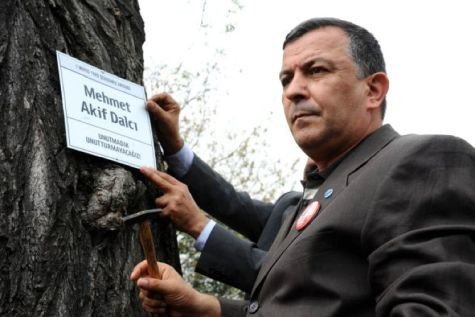
20 years later
I attended the commemoration held for Mehmet Akif Dalcı in Şişhane on behalf of thousands of laborers ahead of May 1, 2009, 20 years after the rally that I attended as a revolutionary teacher on the May Day of 1989.
In the commemoration ceremony attended by the DİSK, Confederation of Public Employees Trade Unions (KESK) and various social organizations, we had a signboard with Dalcı's name on it nailed on a tree.
The signboard that read, "May 1, 1989 - We don't forget Mehmet Akif Dalcı, we won't let him be forgotten" was ripped off later. All I know is that you do not have the power to rip it off from the heart of the working class.
About Sami EvrenAlumni of Konya Selçuk Institution of Education Department of Sciences. Member |
 |
| This text was created and maintained with the financial support of the European Union provided under Etkiniz EU Programme. Its contents are the sole responsibility of "IPS Communication Foundation" and do not necessarily reflect the views of the European Union. |
(SE/APK/YK/SD)




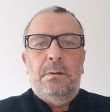
_(1).jpg)
